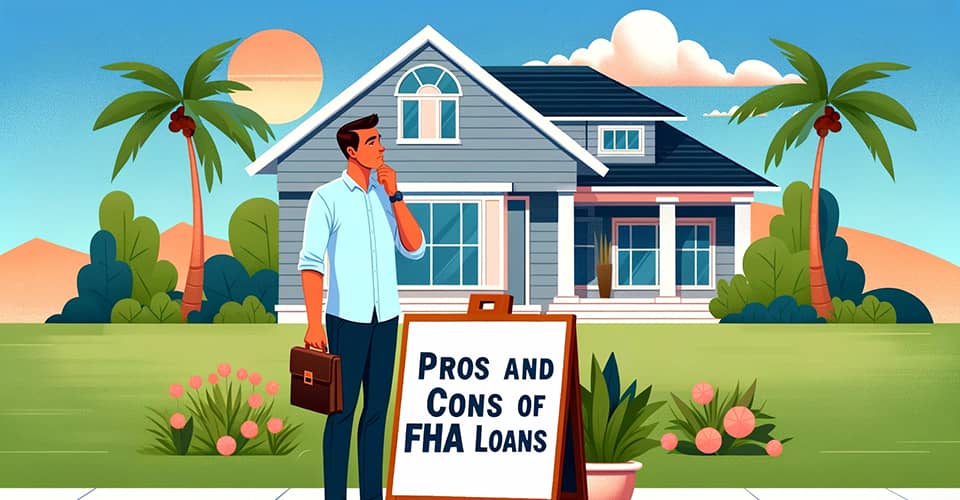What Are The Pros and Cons of FHA Loans in Florida?
This blog aims to provide a comprehensive understanding of FHA loans in Florida, helping you weigh the pros and cons to make an informed decision that aligns with your financial and homeownership goals.
Whether you're a first-time homebuyer or looking to refinance, understanding the intricacies of FHA loans in Florida's unique real estate landscape is key to navigating your mortgage journey successfully.
What is an FHA Loan?
FHA loans, guaranteed by the Federal Housing Administration, are designed to make homeownership more accessible, particularly for those struggling to secure conventional mortgages. Established to bridge gaps in the housing market, the FHA plays a pivotal role in assisting a diverse range of borrowers.
One of the most significant benefits of FHA loans is their relatively relaxed requirements regarding credit scores and debt-to-income ratios (DTI).
This is particularly advantageous for first-time homebuyers who might find these financial metrics challenging. FHA loans lower the barriers, offering a more inclusive pathway to owning a home in Florida.
These loans stand out for their flexibility, often making the difference for prospective buyers in securing a loan for their primary residence.
In the following sections, we will delve into the specific offerings of FHA home loans and explore scenarios where opting for an FHA loan could be a strategic move for potential homeowners in Florida.

Pros of FHA Loans in Florida
FHA loans stand as a beacon of opportunity for many aspiring homeowners in Florida, particularly those grappling with less-than-ideal credit scores or higher debt levels.
Recognized for their more accommodating nature compared to other loan types, FHA loans offer several compelling advantages:
Credit History Flexibility
FHA loans are also known for their leniency regarding credit histories. While many loan types necessitate a minimum credit score of 620, FHA loans are accessible to those with scores as low as 580, enabling a lower down payment.
However, it's important to note that lenders like MakeFloridaYourHome set a 580 minimum credit score for FHA loans.
If you're considering a lender that offers FHA loans to borrowers with scores below 500, be cautious of potentially higher interest rates and less favorable terms. If your credit score is a concern, improving it before seeking a home purchase could be a wise strategy.
Low Down Payment Requirements
One of the most appealing aspects of FHA loans is their minimal down payment requirement. Contrary to the traditional 20% down payment expectation, FHA loans in Florida allow homebuyers to make a down payment as low as 3.5% if they have a credit score of 580 or above.
For those with credit scores between 500 and 579, the requirement is 10%. Furthermore, these loans permit the use of gift funds towards the down payment as long as the transfer is properly documented and approved during underwriting.
Borrowers might also be eligible for down payment assistance programs, subject to lender and state guidelines.
Flexible DTI Requirements
FHA mortgages offer more lenient debt-to-income ratio (DTI) requirements. While the FHA suggests a maximum DTI of 43% in some scenarios, this can vary based on factors like credit score and available cash.
FHA loans also allow the inclusion of a co-borrower’s income for loan approval, even if the co-borrower won't reside in the property. Adding a non-occupant co-borrower, such as a family member or friend, can enhance your financial flexibility and borrowing power.
Competitive Interest Rates
Regarding mortgage interest rates, FHA loans often provide more favorable fixed rates than other loan types. Adjustable-rate mortgages (ARMs) are also available under FHA loans.
Your rate will be influenced by broader market trends and personal factors like income, credit score, loan amount, down payment, and the loan term.
In summary, FHA loans in Florida provide a pathway to homeownership for those who might otherwise face challenges in meeting conventional loan requirements.
Their lower down payment requirements, credit score flexibility, competitive interest rates, and adaptable DTI guidelines make them an attractive option for many prospective homeowners.
Cons of FHA Loans in Florida
While FHA loans offer numerous benefits, prospective homeowners in Florida should also be aware of their potential downsides. Here are some key considerations:
Mortgage Insurance Premiums (MIPs)
FHA loans require an upfront mortgage insurance premium (UFMIP) and an ongoing annual mortgage insurance premium (MIP). This applies regardless of your down payment size. The annual MIP is part of your monthly mortgage payment.
If your down payment is less than 10%, MIP remains for the life of the loan; it's removed after 11 years if it is 10% or more. The UFMIP, calculated at 1.75% of your loan amount, is due at closing but can be financed into the loan.
Stringent Property Requirements
FHA loans mandate that the property meets specific minimum safety, security, and structural integrity standards. A professional appraiser assesses the property to determine if it meets these FHA standards and also appraises its value.
This appraisal process can be more rigorous than that for conventional loans. If a home fails to meet these standards, securing an FHA loan for it can be challenging.
Loan Limits
The amount you can borrow with an FHA loan varies based on location and property type. Nationally, the limit for a single-family home in a lower-cost area is $472,030, while high-cost areas have a higher limit, potentially up to $1,089,300.
It's important to research the specific FHA loan limits in your desired area to determine if this type of loan aligns with your borrowing needs.
Understanding these limitations is crucial for Florida residents considering an FHA loan. While they provide a pathway to homeownership for many, the associated insurance premiums, property standards, and borrowing limits might influence your decision.
Evaluating these factors against your financial situation and homeownership goals is essential to make the best choice for your future.
Florida FHA Loan Eligibility Requirements
To qualify for an FHA loan in Florida, applicants must meet specific criteria set by the Federal Housing Administration. These requirements ensure that FHA loans are accessible to many borrowers while maintaining responsible lending practices.
Home Appraisal and Residence Requirements
-
FHA-Approved Appraisal - The property must be appraised by an FHA-approved appraiser.
-
Primary Residence - FHA loans are only available for primary residences, not for investment properties or second homes.
-
Occupancy - You must move into the property within 60 days of closing.
- Property Inspection - An inspection must confirm that the property meets the FHA's minimum standards.
Down Payment and Mortgage Insurance
-
Down Payment - The minimum down payment for FHA loans is 3.5% for credit scores of 580 and above and 10% for scores between 500 – 579.
-
Gift Assistance - Down payments can include gift assistance but must be well-documented.
- Mortgage Insurance Premium (MIP) - All FHA loans require MIP, which includes an upfront premium (typically 1.75% of the base loan amount) and an annual premium (approximately 0.15% – 0.75% of the base loan amount).
Credit Score and DTI Ratio
-
Credit Score - A range of factors, including credit utilization and payment history, influence your credit score.
- Debt-to-Income (DTI) Ratio - This is the percentage of your monthly gross income that goes towards paying debts. The FHA states that your monthly mortgage payment should not exceed 31% of your monthly gross income, and your total DTI should not exceed 43% under certain conditions. A higher credit score might qualify you with a higher DTI.
Loan Limits
- County-Based Limits - The maximum amount you can borrow with an FHA loan depends on the county. In high-cost areas, limits can go up to $1,089,300 for 2023. The FHA mortgage limits page can provide specific limits for your area.
Interest Rates and Income Requirements
-
Competitive Interest Rates - FHA loans often offer lower interest rates compared to conventional loans, influenced by factors like income, credit score, and the amount borrowed.
- Income Verification - There's no specific income requirement, but you must demonstrate a steady employment history and income verifiability through documents like pay stubs, W-2s, and tax returns.
Understanding these eligibility criteria is crucial for anyone in Florida considering an FHA loan. Each requirement ensures that the FHA loan is suitable for your financial situation and homebuying goals.
Florida FHA Loan FAQs
Do you still have questions about FHA loans in Florida? Don't worry; we've got you covered! Check out our FAQ section below for answers to some of the most common inquiries.
What is an FHA loan?
An FHA loan is a mortgage insured by the Federal Housing Administration (FHA). This means the FHA will pay your lender if you default on your loan. This makes FHA loans a good option for borrowers with lower credit scores or smaller down payments.
What are the down payment requirements for an FHA loan in Florida?
The minimum down payment for an FHA loan in Florida is 3.5%. However, you may be required to put down more if your credit score is lower than 580.
What are the credit score requirements for an FHA loan in Florida?
The minimum credit score for an FHA loan in Florida is 500. However, you may be able to qualify with a lower credit score if you have other compensating factors, such as a large down payment or a co-signer.
What are the Florida debt-to-income (DTI) ratio requirements for an FHA loan?
The maximum DTI ratio for an FHA loan in Florida is 43%. However, your lender may be willing to approve you with a higher DTI ratio if you have other compensating factors, such as a large down payment or a co-signer.
What are the mortgage insurance premiums (MIP) for an FHA loan in Florida?
There are two types of MIPs for FHA loans - an upfront MIP and an annual MIP. The upfront MIP is 1.75% of the loan amount and is due at closing. The annual MIP is paid monthly and is 0.85% of the loan amount.
What are the property requirements for an FHA loan in Florida?
FHA loans have stricter property requirements than conventional loans. The property must be located in an area that meets FHA standards and in good condition.
What are the loan limits for an FHA loan in Florida?
The loan limit for an FHA loan in Florida is $472,030 for a single-family home in a lower-cost area. The loan limit is higher in high-cost areas.
Can I use gift funds for the down payment on an FHA loan in Florida?
Yes, you can use gift funds for the down payment on an FHA loan in Florida. However, the gift funds must be from a permitted source, and the transaction must be properly documented.
Can I use an FHA loan to refinance my existing mortgage?
Yes, you can use an FHA loan to refinance your existing mortgage. This can be a good option if you want to lower your interest rate, shorten your loan term, or get cash out of your home.
How do I apply for an FHA loan in Florida?
You can apply for an FHA loan in Florida through a mortgage lender. The lender will review your financial information and credit report to determine if you qualify for a loan.
Additional questions?
Consult a qualified mortgage lender like MakeFloridaYourHome or a financial advisor for more information about FHA loans in Florida.
With over 50 years of mortgage industry experience, we are here to help you achieve the American dream of owning a home. We strive to provide the best education before, during, and after you buy a home. Our advice is based on experience with Phil Ganz and Team closing over One billion dollars and helping countless families.

About Author - Phil Ganz
Phil Ganz has over 20+ years of experience in the residential financing space. With over a billion dollars of funded loans, Phil helps homebuyers configure the perfect mortgage plan. Whether it's your first home, a complex multiple-property purchase, or anything in between, Phil has the experience to help you achieve your goals.


 By
By  Edited by
Edited by 






